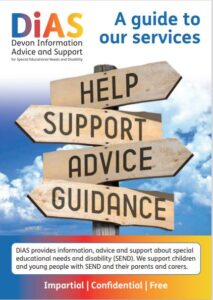It’s a statutory service, which means it must be provided by law. Every local authority in England has this type of service and what they provide is shaped by chapter 2 of the SEND Code of Practice and the National Minimum Standards for IASS services.
This short animation from the Council for Disabled Children tells you what services like ours must do for children and young people with SEND and their families, and how we meet the standards set for information, advice and support services.
Our main activity is to provide a service for children and young people with special educational needs and disabilities, aged up to 25, and their parents or carers. We give support around SEND issues at every stage of a child’s education, including into further education and adulthood. The service offers:

Our main activity is to provide a service for children and young people with special educational needs and disabilities, aged up to 25, and their parents or carers. We give support around SEND issues at every stage of a child’s education, including into further education and adulthood. The service offers:

DIAS has a reference group made up of parents, carers and professionals from schools, inclusion and early years. The group’s role is to guide the growth and development of the service. They meet three times a year to talk about a wide range of issues for DiAS, including:
These are the principles that parents and carers feel should underpin the development and production of information resources and services for parents and carers.
Information should be clear and accurate, accessible and relevant.
If you want to find out more about our work with parents and carers, or about our information work, contact Sarah Smith.
As part of our quality standards we deliver training to parents about SEND issues and support. We work with parents to deliver our training.
For parents, we offer our free 'Making Sense of' training programme.
If you want to find out more about our training for parents we regularly post information about them on our Facebook page. You can find a list of what is coming up on our events page.
We work with national and local organisations and teams to influence policy and change or improve practice.
We gather themes and trends from our work and share these to inform strategic decision making of Education, Health and Care commissioning and services. We always take care to be impartial and maintain confidentiality.
Here are some of the things we do.
If you’d like to know more about any aspect of our work, please contact us.
Page reviewed: April 2024
Page due for review: April 2026
DiAS (Devon, Information, Advice and Support) supports children and young people aged 0-25 with special educational needs and disabilities (SEND), and their parents and carers.
Helpful links
Contact us
Legal
© 2025 Devon Information Advice & Support
Searching...